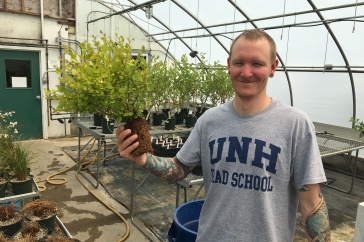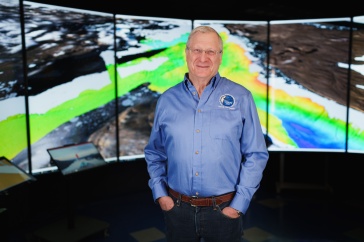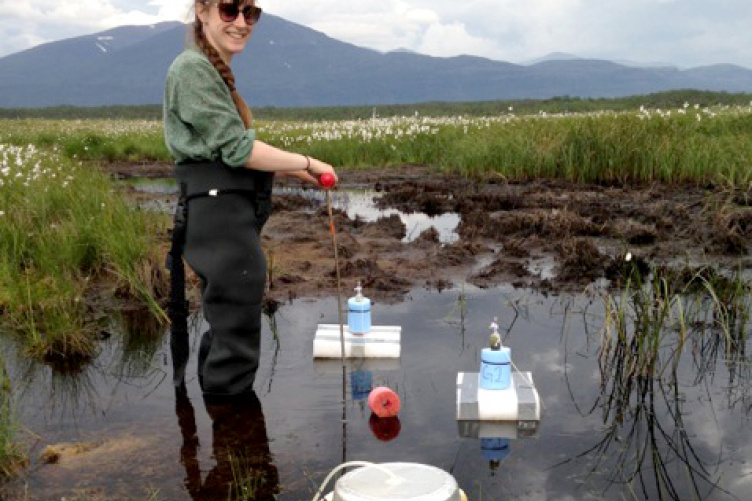
Belmont, Mass. native Sophie Burke’s decision to come to UNH in September 2009 was pretty much a no-brainer.
“I started my search looking for a small liberal arts college where I could major in environmental sciences-ecosystems. When I discovered that many such schools didn’t have environmental science programs of the same caliber as UNH the choice became very clear,” says Burke.
It also soon became clear that not only had she chosen the right program at the right school but that an unanticipated wealth of opportunities lay waiting to be tapped.
When she took the class Techniques in Environmental Science taught by Ruth Varner of the Earth Systems Research Center, Burke recalls, “I told her about my interest in doing international research and she mentioned a National Science Foundation grant she was writing that would fund undergraduates to travel to northern Sweden to conduct biogeochemical research of various kinds. I was absolutely floored by the concept that one could apply for funding to travel to cool places and do very cool research!”
And apply she did. Since that initial meeting with Varner, Burke has not only been to Sweden for three stints—from undergraduate researcher to becoming Varner’s research assistant last year — but also spent time in New Zealand in her junior year as part of the EcoQuest program. Over the years she has successfully garnered funding through internships, scholarships and fellowships to make it all possible.
Her Fulbright Fellowship funded a return to New Zealand in January where, for 10 months, she will do field research and Ph.D. coursework at the University of Waikato in Hamilton.
Says Burke, “I’ll be learning about peatlands that formed in a vastly different climate than what I’m used to — that is, subtropical versus subarctic. And I’ll also learn about different ways that carbon flux is monitored in peatland ecosystems by taking measurements from a flux tower for the first time as well as doing incubation work.”
The Sweden work is conducted under both a grant from the American-Swedish Institute and the NSF-funded Northern Ecosystems Research for Undergraduates program that focuses on the impacts of climate change on permafrost and lake environments in the Stordalen mire complex some 124 miles north of the Arctic Circle. NERU, which Varner directs, is a collaboration between UNH and the Abisko Scientific Research Station in Abisko, Sweden. After three years, NERU has thus far provided 30 undergraduates from colleges around the nation with the opportunity to travel abroad, cut their teeth on state-of-the-art climate change field research, and do coursework at UNH.
"Elevator speech" upward
Burke’s Fulbright Fellowship and return to New Zealand is a direct result of her research in Abisko.
In December of 2012 she presented a poster on the her Sweden work at the American Geophysical Union’s Fall Meeting where she met David Campbell of the University of Waikato. Much of Campbell’s research has been focused on indigenous ecosystems, particularly the peat wetlands of northern New Zealand.
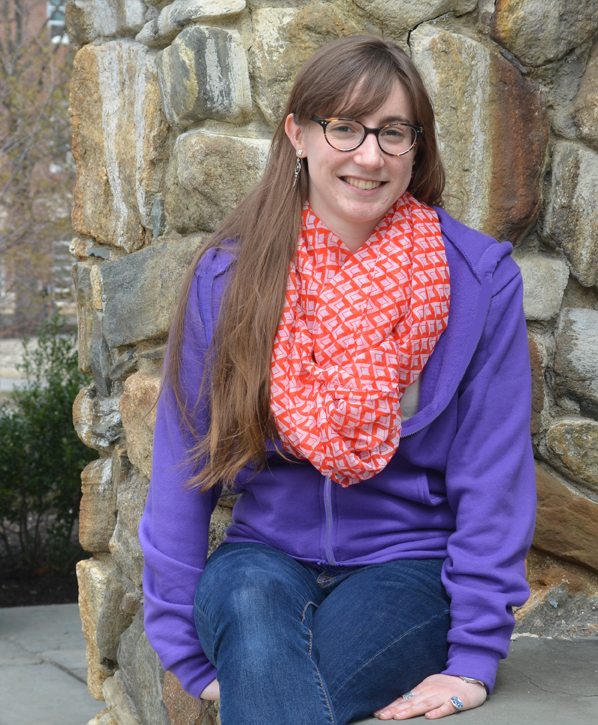 |
|
Sophie Burke (Photo: Kristi Donahue, UNH-EOS) |
“In what I call my ‘elevator speech’ I told him right then and there that I would love to come back to New Zealand and work with him,” Burke says. “I was considering going to graduate school there but funding was an issue. So with Ruth’s encouragement, as well as Dr. Campbell’s enthusiastic support, I applied for the Fulbright.”
Ten UNH applicants competed in the 2014-2015 Fulbright competition, with three advancing as finalists. Burke has just begun her Ph.D. in the UNH Natural Resources and Earth System Science program — Varner is her advisor.
What has sustained Burke’s interest and led her to her chosen doctoral work is the desire to gain a scientific understanding of how a warming climate is altering subarctic (as well as subtropical) landscapes and how that in turn influences how carbon is processed and then released to the atmosphere.
“I’m very interested in how interconnected everything is and how the biogeochemical processes I monitor are closely linked to atmospheric conditions, and vise versa over a longer timescale,” Burke says. “Peatlands are one of the most effective storage areas of carbon and can be some of the most sensitive ecosystems to environmental change, so I find monitoring how the changing climate is already affecting these landscapes to be a vital piece of environmental research. What’s going to happen when these storage areas are no longer working?”
Model mentor
Another sustaining aspect of her work is her long-term interest in teaching and mentoring, the latter which she has both received and delivered working closely in the NERU program and influenced by Varner’s style.
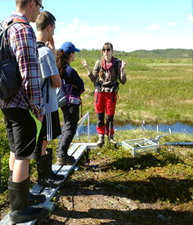 |
|
Sophie Burke gives a group of |
“Ruth is a very special mentor," she says. "Her enthusiasm for her research is infectious and she is so genuine in her desire to help her students succeed. I have always admired and appreciated her ability to treat everyone as a colleague whether they are an undergraduate student on their first research experience or a collaborating professor. To her, everyone brings valuable experience and perspectives to the table.”
Burke’s Fulbright will provide further opportunities for teaching and mentoring as she will again participate in the New Zealand-based EcoQuest program — presenting her work to EQ students as well as giving tours of her research sites.
“I hope to gain valuable experience in place-based education by taking students out into the field and showing them first hand the scientific concepts they are learning in class. As a very visual learner myself, I find this one of the best ways to teach.”
Related:
A Wetland Awaited
-
Written By:
Tracey Bentley | Communications and Public Affairs















































